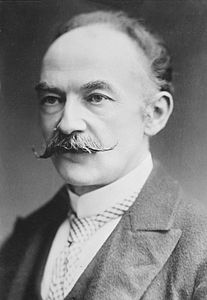The Mother Mourns.
Thomas Hardy 1840 (Stinsford) – 1928 (Dorchester, Dorset)
When mid-autumn's moan shook the night-time,
And sedges were horny,
And summer's green wonderwork faltered
On leaze and in lane,
I fared Yell'ham-Firs way, where dimly
Came wheeling around me
Those phantoms obscure and insistent
That shadows unchain.
Till airs from the needle-thicks brought me
A low lamentation,
As 'twere of a tree-god disheartened,
Perplexed, or in pain.
And, heeding, it awed me to gather
That Nature herself there
Was breathing in aerie accents,
With dirgeful refrain,
Weary plaint that Mankind, in these late days,
Had grieved her by holding
Her ancient high fame of perfection
In doubt and disdain . . .
- "I had not proposed me a Creature
(She soughed) so excelling
All else of my kingdom in compass
And brightness of brain
"As to read my defects with a god-glance,
Uncover each vestige
Of old inadvertence, annunciate
Each flaw and each stain!
"My purpose went not to develop
Such insight in Earthland;
Such potent appraisements affront me,
And sadden my reign!
"Why loosened I olden control here
To mechanize skywards,
Undeeming great scope could outshape in
A globe of such grain?
"Man's mountings of mind-sight I checked not,
Till range of his vision
Has topped my intent, and found blemish
Throughout my domain.
"He holds as inept his own soul-shell -
My deftest achievement -
Contemns me for fitful inventions
Ill-timed and inane:
"No more sees my sun as a Sanct-shape,
My moon as the Night-queen,
My stars as august and sublime ones
That influences rain:
"Reckons gross and ignoble my teaching,
Immoral my story,
My love-lights a lure, that my species
May gather and gain.
"'Give me,' he has said, 'but the matter
And means the gods lot her,
My brain could evolve a creation
More seemly, more sane.'
- "If ever a naughtiness seized me
To woo adulation
From creatures more keen than those crude ones
That first formed my train -
"If inly a moment I murmured,
'The simple praise sweetly,
But sweetlier the sage'--and did rashly
Man's vision unrein,
"I rue it! . . . His guileless forerunners,
Whose brains I could blandish,
To measure the deeps of my mysteries
Applied them in vain.
"From them my waste aimings and futile
I subtly could cover;
'Every best thing,' said they, 'to best purpose
Her powers preordain.' -
"No more such! . . . My species are dwindling,
My forests grow barren,
My popinjays fail from their tappings,
My larks from their strain.
"My leopardine beauties are rarer,
My tusky ones vanish,
My children have aped mine own slaughters
To quicken my wane.
"Let me grow, then, but mildews and mandrakes,
And slimy distortions,
Let nevermore things good and lovely
To me appertain;
"For Reason is rank in my temples,
And Vision unruly,
And chivalrous laud of my cunning
Is heard not again!"
Font size:
Submitted on May 13, 2011
Modified on March 05, 2023
- 2:20 min read
- 134 Views
Quick analysis:
| Scheme | XABC AADA AAXC EXFC XGHC EGIC XXBC XBAC XFXC XHJC KDLC XXLC GAMC EEHC AHLC BAKX NJMC XEIC GHFC EJNC FLAA XAGX |
|---|---|
| Closest metre | Iambic tetrameter |
| Characters | 2,745 |
| Words | 468 |
| Stanzas | 22 |
| Stanza Lengths | 4, 4, 4, 4, 4, 4, 4, 4, 4, 4, 4, 4, 4, 4, 4, 4, 4, 4, 4, 4, 4, 4 |
Translation
Find a translation for this poem in other languages:
Select another language:
- - Select -
- 简体中文 (Chinese - Simplified)
- 繁體中文 (Chinese - Traditional)
- Español (Spanish)
- Esperanto (Esperanto)
- 日本語 (Japanese)
- Português (Portuguese)
- Deutsch (German)
- العربية (Arabic)
- Français (French)
- Русский (Russian)
- ಕನ್ನಡ (Kannada)
- 한국어 (Korean)
- עברית (Hebrew)
- Gaeilge (Irish)
- Українська (Ukrainian)
- اردو (Urdu)
- Magyar (Hungarian)
- मानक हिन्दी (Hindi)
- Indonesia (Indonesian)
- Italiano (Italian)
- தமிழ் (Tamil)
- Türkçe (Turkish)
- తెలుగు (Telugu)
- ภาษาไทย (Thai)
- Tiếng Việt (Vietnamese)
- Čeština (Czech)
- Polski (Polish)
- Bahasa Indonesia (Indonesian)
- Românește (Romanian)
- Nederlands (Dutch)
- Ελληνικά (Greek)
- Latinum (Latin)
- Svenska (Swedish)
- Dansk (Danish)
- Suomi (Finnish)
- فارسی (Persian)
- ייִדיש (Yiddish)
- հայերեն (Armenian)
- Norsk (Norwegian)
- English (English)
Citation
Use the citation below to add this poem to your bibliography:
Style:MLAChicagoAPA
"The Mother Mourns." Poetry.com. STANDS4 LLC, 2024. Web. 16 Apr. 2024. <https://www.poetry.com/poem/36534/the-mother-mourns.>.



Discuss the poem The Mother Mourns. with the community...
Report Comment
We're doing our best to make sure our content is useful, accurate and safe.
If by any chance you spot an inappropriate comment while navigating through our website please use this form to let us know, and we'll take care of it shortly.
Attachment
You need to be logged in to favorite.
Log In